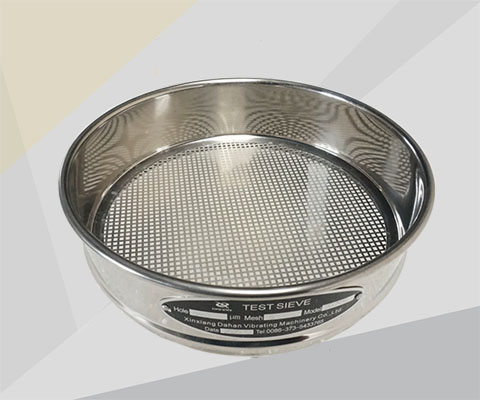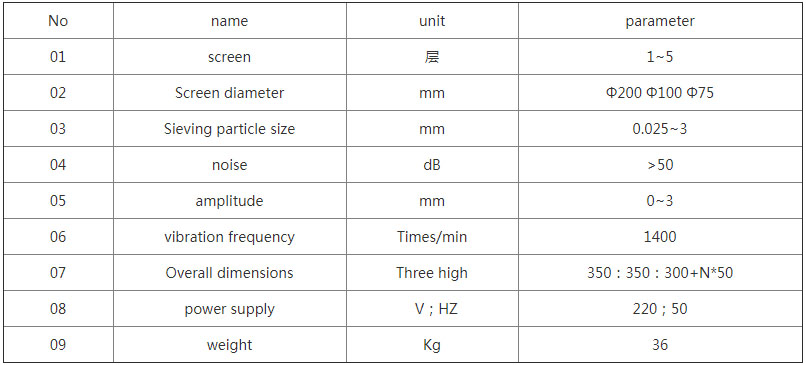
Material particle size classification, particle size detection tools
Screen diameter: 200,100,75 mm
Screening particle size: 0.025-3mm
Vibration frequency: 1400 times/min
Applied Material
Cement, glass, ceramics, paper making, etc
Test sieve are mainly used for screening in laboratories or field research, and are usually used for screening, grading or separation of granular materials. Test sieves are usually small and easy to move, and are used to quickly and accurately determine the particle distribution, particle size distribution and particle shape of granular materials.

| Products | 600 Micron Stainless Steel Mesh Laboratoty Test Sieve for Cement |
| Material | Sus304, SS316Stainless steel, brass, or customized |
| Mesh count | Plain weave 1-635 mesh Dutch weave to 500 x 3500 mesh |
| Micron size | 1 micron - 2000 micron |
| Sizes | Diameter: 6 8 10 12 24 inches, 15cm 20cm 30cm 35cm 40mm or customized Height : 5mm, 8cm or customized |
| Features | Corrosion resistant, reusable, long use-life. Easy-clean |
| Applications | Lab/laboratory test sieve, sand, soil sieve and others |
The test screen mesh is divided into three kinds

Wire braided mesh: wide range of mesh applications from 2.36 mm to 0.02 mm with only square mesh.
Punching plate screen: mainly used in large mesh, there are round hole and square hole two kinds of mesh from 0.2 to several hundred mm.
Electric forming screen: mainly used for high-precision occasions, can do each mesh in the average error range
The test screen is made of SUS304 polished stainless steel, the thickness is 0.6 mm, the overall shape is firm and durable, non-magnetic, the screen and the screen frame are fixed by welding, not relaxed. Heat resistance below 300 degrees.

Precise screening: It can provide accurate particle distribution data to help users understand the size and shape distribution of particulate materials.
Portable design: Some test sieves have a portable design, which is easy to move and use.
Easy to operate: Test sieves are usually simple to operate and easy to master, and can quickly start screening particulate materials.
Adjustability: It has adjustable vibration amplitude and frequency, which can be adjusted according to the characteristics of different materials.
Wide application: Test sieves are suitable for many fields, including mining, building materials, chemicals, food processing, etc.


The test sieve has a simple structure and is effective and stable in the particle analysis and screening process. The design and material selection of these components play a key role in the performance and durability of the test sieve.
Mesh/Sieve: The mesh is the most technical part of the test sieve and is used to screen particles. The commonly used mesh type is a stainless steel woven wire mesh with opening sizes ranging from 4 inches (100 mm) to 635 mesh (20 microns).
Frame: The frame is a circular metal ring that holds the mesh in place, providing support and fixation. In the United States, standard frame sizes are 3 inches, 8 inches, and 12 inches; internationally, common standard sizes are 100 mm, 200 mm, and 300 mm. The sieve frame is usually made of stainless steel or brass.
Skirt: The skirt is an important part of the test sieve, and its main function is to allow the sieves to be stacked without tipping over.

The size of the test sieve can vary according to different models and brands, and usually includes the following key size parameters:
Sieve frame size (outer diameter/inner diameter): The sieve frame of the test sieve is usually made of metal or plastic, and the common size is 200 mm-300 mm in diameter.
Sieve mesh size: The sieve mesh is a key component in the test sieve, and its size is usually selected according to specific needs. It can be a standard mesh size, such as 0.5 mm, 1 mm, 2 mm, etc.
Overall size: The overall size of the test sieve includes length, width and height, and the overall size of different models of test sieves will also vary.

Ore and mineral particles: Used for screening and grading of granular materials such as ores and mineral sands in the mining and metallurgical industries.
Building material particles: For example, separation and screening of particles of building materials such as sand, gravel, cement, etc.
Chemical raw materials: Used for screening of granular raw materials such as plastic particles, granular chemicals, etc. in the chemical industry.
Food particles: Used for screening and classification of granular materials such as flour, rice grains, cereals, etc. in the food processing industry.
Pharmaceutical raw materials: Used for screening and grading of granular pharmaceutical raw materials in the pharmaceutical industry.
Fertilizer particles: Used for screening and classification of fertilizer particles in the agricultural field.

Dahan Machinery's test sieve products cover a variety of sizes, specifications and materials to meet the particle analysis and screening needs of different fields. In addition to high-quality products, we are also known for our excellent customer service and technical support. Whether in equipment selection, installation and commissioning or after-sales service, we are always committed to providing customers with the best solutions and support. Our test sieve prices are generally Price: $23.00-$850.00/Set. If you are interested in test sieve products, please feel free to contact us for a detailed quotation!